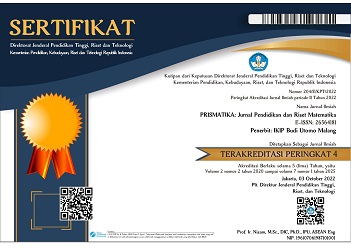PENERAPAN MODUL BERBASIS PROJECT BASED LEARNING PADA MATA KULIAH ANALISIS REAL 2
Abstract
The education dharma program states that lecturers have the main task of administering education. Permenristekdikti No. 44 of 2015 states the minimum criteria for the learning process, namely CPL (Graduate Learning Outcomes). CPL requires student-centered learning and the role of the lecturer as a facilitator so that Student Center Learning (SCL) is created. Real Analysis 2 which is a follow-up course from Real Analysis 1. Real Analysis 2 is a pure mathematics course that contains a collection of definitions and theorems and lemmas that involve proof. So far, learning real analysis is difficult for students to accept, namely making connections between one rule and another. One learning model that facilitates students to fulfill the CPL for Real Analysis 2 course is the PjBL (Project Based Learning) model. PjBL implementation must be supported by adequate learning facilities. Therefore, a module based on the PjBL model is needed. The use of this PjbL-based module is expected that students will be able to solve mathematical problems and support the fulfillment of CPL courses which results in the formation of creative and systematic mathematics students who are good at solving problems and have the capabilities and competencies needed by the world of work.
References
Firmasari, S., & Pramuditya, S. A. (2018). Desain Bahan Ajar Analisis Real dengan Taksonomi Solo Dilengkapi Soal-Soal Bentuk Superitem. Jurnal Elemen, 4(1), 20. https://doi.org/10.29408/jel.v4i1.502
Goodman, B., & Stivers, J. (2010). Project-Based Learning. Educational Psychology. ESPY 505.
Khoiruddin, A., & Suwito, D. (2021). Penerapan Model Pembelajaran Project Based Learning (PjBL) untuk Meningkatkan Aktivitas Dan Hasil Belajar Siswa Pada Kompetensi Dasar Aksi Dan Reaksi Gaya SMK Negeri 7 Surabaya. JPTM, 11(01), 38–43.
Laili, I., Ganefri, & Usmeldi. (2019). Efektivitas pengembangan e-modul project based learning pada mata pelajaran instalasi motor listrik. Jurnal Imiah Pendidikan Dan Pembelajaran, 3(3), 306–315. https://ejournal.undiksha.ac.id/index.php/JIPP/article/download/21840/13513
Rusdi, M. 2020. Penelitian Perlakukan Kependidikan (Educational Treatment-Based Research) : Perpaduan Penelitian Desain, Penelitian Tindakan, Dan Penelitian Eksperimen Dalam Permasalahan Kependidikan. Cetakan ke-1. Depok: Rajawali Pers.
Sani, R.A. (2014). Inovasi Pembelajaran. Jakarta: Bumi Aksara.
Sinta, M., Sakdiah, H., Novita, N., Ginting, F. W., & Syafrizal, S. (2022). Penerapan Model Pembelajaran Project Based Learning (PjBL) untuk Meningkatkan Kemampuan Berpikir Kreatif Siswa pada Materi Hukum Gravitasi Newton di MAS Jabal Nur. Jurnal Phi Jurnal Pendidikan Fisika Dan Fisika Terapan, 3(3), 24. https://doi.org/10.22373/p-jpft.v3i3.14546
Wahyu, R., Islam, U., & Rahmat, R. (2018). Implementasi Model Project Based Learning ( PJBL ) Ditinjau dari Penerapan Implementasi Model Project Based Learning (PJBL) Ditinjau dari Penerapan Kurikulum 2013. Teknoscienza, 1(1), 50–62.
Yurinanda, S., & Rozi, S. (2023). Penerapan Pembelajaran Berbasis Proyek Pada Matakuliah Matematika Diskrit Untuk Meningkatkan Keterampilan Mahasiswa Dalam Memanfaatkan Struktur Diskrit Dalam Menyelesaikan Masalah. Jurnal Absis : Jurnal Pendidikan Matematika Dan Matematika, 5(2), 666–679.







.png)




